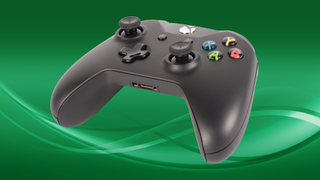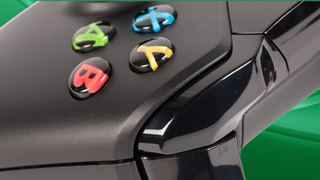Why you can trust TechRadar
For all its ambitions of becoming a true media hub, the Xbox One is a games console first and foremost, seemingly built around aiding the increasing number of living rooms that see interactive entertainment gracing the big screen more often than TV or movies.
Its home screen is packed with ways to play, share and (perhaps more so than anything else) buy games, not to mention indulge in gaming pursuits while you perform unrelated activities: playing as you use Skype to call disgruntled family members, or keeping one eye on a Twitch stream as you watch TV.
Xbox One: performance

Inside the big black box, Microsoft has included an AMD processor with an impressive of speedy 32MB of ESRAM and 8GB of low-latency DDR3 memory. Standard models come with a creditable 500GB mechanical hard drive, although all games, disc-based or not, now require an installation, so that will fill faster than you might think, especially when compared to last generation consoles, however thankfully a 1TB version has since been announced.
Those game installations can provide a small speedbump to playing the game you've just bought, more so than on PS4 in most cases. The disc copy of Madden for Xbox One needed six minutes to reach 25% installation before letting us on the gridiron. The PS4 version needed two minutes, and an additional minute to download a patch before online features were enabled.
While it's not a major problem in and of itself, it's worth taking into account that games are beginning to add major content downloads alongside the installation, simply to ship on a single disc. Halo: The Master Chief Collection requires a 20GB patch simply to access its online features.
I doubt this will become standard, but with day one patches being common, I recommend reading up on individual games to avoid any "I want to play now" frustration. Despite its powerful innards, much has been made of the Xbox One's inferiority to PS4 in terms of graphical capability. Most notably that comes in the native resolution of multiformat games.

Early third-party games tended to output at 1080p on PS4, and 720p on Xbox One. This has been improved on a tad, although not completely. Call of Duty: Advanced Warfare and Metro Redux both run at 900p on Xbox One compared to the PS4's 1080. Ubisoft even attempted to end the debate by capping Assassin's Creed: Unity at 900p on both consoles, although the resulting furore means we very much doubt this will become standard practice.
It's a minuscule difference to all but the most trained eyes, but more worrying is how certain games include clearly more detailed lighting and textures on PS4. Grand Theft Auto V, for example, loses some environmental detail on Xbox One.
Of course, all of this is in aid of performance, and it's not in vain. Games are almost universally smooth, with short loading times. To the console's credit, the notoriously troublesome Assassin's Creed: Unity ran far better on Microsoft's console upon release than on other platforms.
With advancements already being made, and Microsoft's decision to drop Kinect in favour of optimising processing power, it's not outlandish to suggest that the gap will be closed even further as the console ages, but right now though we simply can't say that it matches the PS4 for sheer graphical heft.
Xbox One: games
That said, as far as the games themselves are concerned, Xbox One has a number of great ones. Whether its shooters such as Halo Infinite and Gears 5, racing games like Forza Horizon 5 or RTS games like Halo Wars 2, the Xbox platform has exclusives to suit any taste.
Whether it's strong than the PS4's Uncharted 4, Horizon Zero Dawn, and Persona 5 or the Nintendo Switch's Legend of Zelda: Breath of the Wild and Mario Kart will come down entirely to your own personal taste. The One's own games have occasionally included some big hiccups. One of Microsoft's tentpole releases, Halo: The Master Chief Collection arrived in a disastrously poor state, though its since been fixed up.
The game, which comprises Halos 1 - 4 remastered with updated single and multiplayer portions of the FPS classics, had been plagued by matchmaking issues since release, leading developers 343 Industries to offer huge chunks of upcoming DLC (including the entirety of Halo: ODST) as free downloads to placate disgruntled owners. The company's indie games offering, ID@Xbox, should also provide a boost.
Then there's backward compatibility. The software emulation isn't exactly full backwards compatibility but we've seen a great deal of the 360's catalogue become available. Simply put your 360 disc in the drive for authentication, then you can download the Xbox One compatible version to play on your new console, with all the social and multitasking features it offers.
Xbox One: controller

It's a testament to Microsoft's sterling work on the Xbox 360 controller that the Xbox One Controller is merely an iteration (not to mention that Nintendo's Wii U Pro Controller openly acknowledged its excellence by nabbing the design almost wholesale).
While slightly chunkier, and with a grippier matte texture, the basic design remains almost identical. Asymmetrical sticks lend themselves to most games and the various contours have been shaped specifically to help you play for frankly dangerous lengths of time before getting the controller cramps of old.
Unfortunately, that unchanged design still means you'll need a steady supply of AA batteries to keep it running, unless you buy the overpriced charge-and-play kit. However battery life is substantially better than the PS4's quickly-drained DualShock 4 as a result.
What changes have been made tend towards minor improvements. The menu button has been shifted to the top of controller to stop accidental presses, and the sticks have been surrounded with what feels like Kevlar, a perfect addition for twitchier games.
The new Impulse rumble system, which was introduced to early testers by simulating the feeling of a heartbeat in the centre of the controller, has barely been used besides offering the feeling of some arcade lightgun-like force feedback on trigger pulls. It's something of a gimmick, but a pleasant one, although it does seem to have resulted in triggers that feel a little flimsy when used normally, especially when compared to the 360 equivalent.

The new Impulse rumble system, which was introduced to early testers by simulating the feeling of a heartbeat in the centre of the controller, has barely been used besides offering the feeling of some arcade lightgun-like force feedback on trigger pulls. It's something of a gimmick, but a pleasant one, although it does seem to have resulted in triggers that feel a little flimsy when used normally, especially when compared to the 360 equivalent.
It's an improvement in almost every other way, however and, for my money, the best controller of this generation of consoles. While it lacks the DualShock 4's more advanced features (touchpad, motion controls, etc.), it's simply a better fit for the hand. Microsoft has even been issuing firmware updates specifically for the controller, meaning responsiveness has improved since launch. That's commitment.
Microsoft has also released an updated Xbox Wireless Controller for the Xbox Series X/S, though it'll work on Xbox One too. There's also the new Xbox Elite Wireless Controller. With a sky-high price tag, extreme customisation, accuracy and paddle switches, the new controller is designed to offer the perfect adjustable controller for any game type.
Jon Porter is the ex-Home Technology Writer for TechRadar. He has also previously written for Practical Photoshop, Trusted Reviews, Inside Higher Ed, Al Bawaba, Gizmodo UK, Genetic Literacy Project, Via Satellite, Real Homes and Plant Services Magazine, and you can now find him writing for The Verge.


